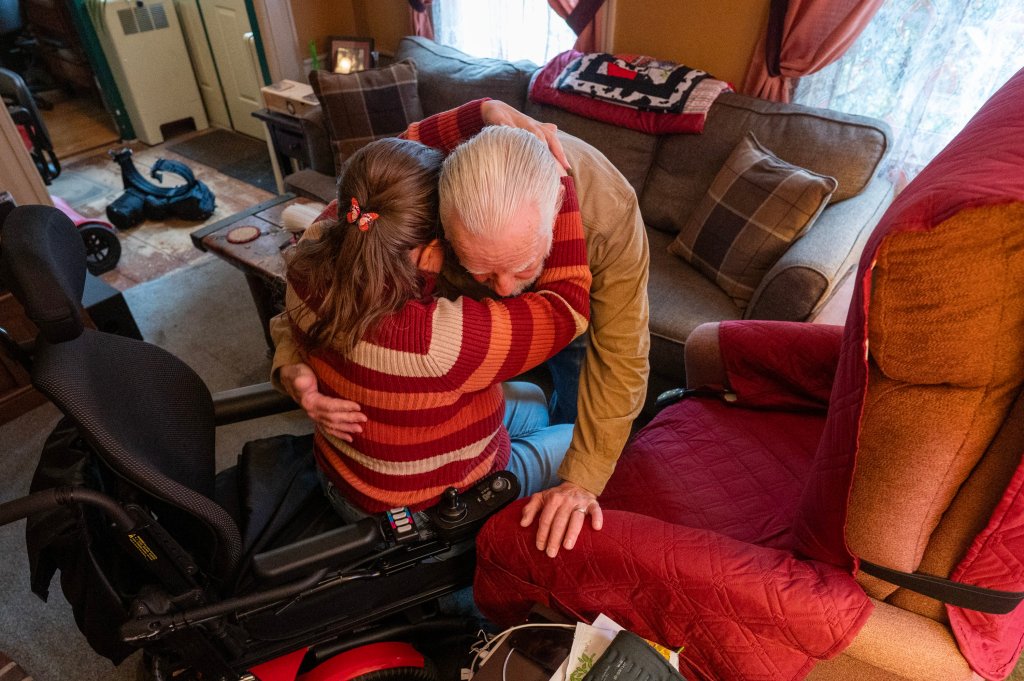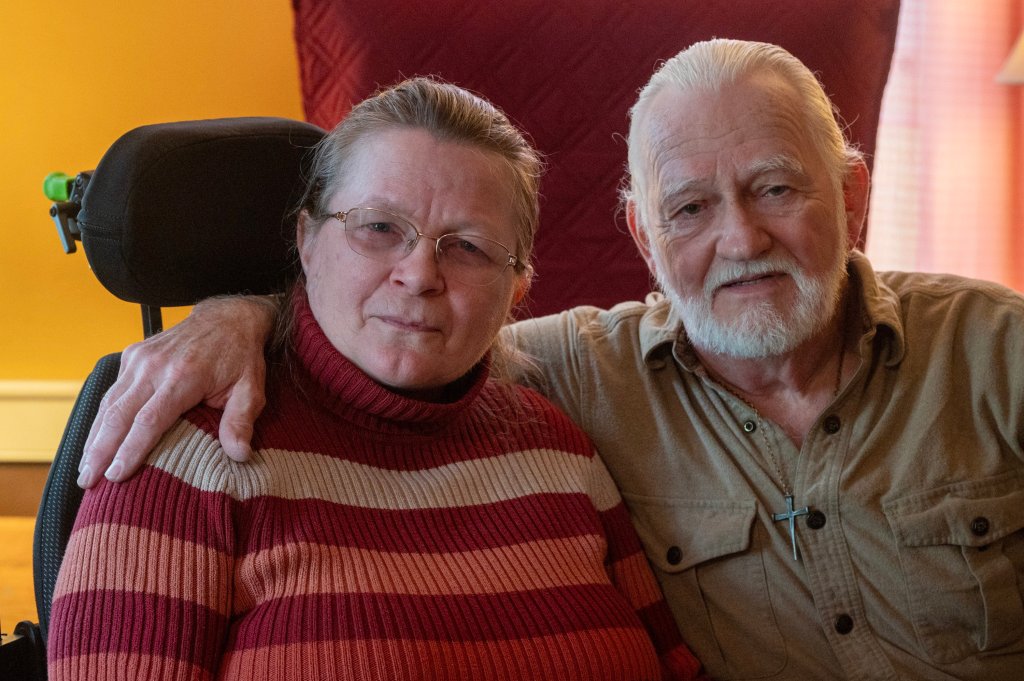
Bonnie Paskell was the high soprano in her North Anson church choir. Then she lost her voice.
What she thought was laryngitis quickly became a flurry of brain scans and visits to far-flung specialists. She lost most of her ability to speak and move without falling. Twice, neurologists she was seeing moved away from Maine and she had to start over with someone new, leading to misdiagnoses and gaps in care.

- Is Maine a good place to age? It’s complicated.
- For many older Mainers, covering costs in retirement is a major challenge
- Where older Mainers can get deals and discounts
- Older Mainers stay connected with help from community groups
- How Mainers should think about saving for retirement at every life stage
Four years after she lost her voice, Paskell, 58, was diagnosed with a slow-progressing form of ALS, a terminal nervous system disease, also known as Lou Gehrig’s disease, that results in loss of muscle control.
There would be challenges ahead, but she wanted to live with her condition at home, where her 71-year-old husband has become her caregiver.
Older Mainers often have to navigate complex care systems as they age. State programs connect those seeking care with care workers, but many say workforce shortages and low wages have curbed the availability and consistency of care. Experts say more training is needed to equip the state’s caregivers and primary care providers to screen for health care conditions in older adults.
Only 4% of Mainers 65 and older live in group settings, such as nursing homes, according to a 2024 needs assessment report from the Catherine Cutler Institute. Most live in family households, often relying on direct care workers or family caregivers to provide in-home care, said Jennifer Crittenden, associate director for research at the University of Maine Center on Aging.
Direct care workers — which include nursing assistants, home health aides and personal care aides — earn less in Maine than others in the state with a similar level of job training, said Arthur Phillips, an analyst at the Maine Center for Economic Policy. And, in 2023, Maine had 166,000 family caregivers providing an estimated $2.9 billion in unpaid care, according to the AARP Public Policy Institute, which analyzes issues around aging.
Phillips said the state has programs for older adults to receive free or low-cost personal and nursing care, but 23,500 hours of approved home care for older adults go undelivered each week in Maine.
“Many of those folks can’t get the care that they need, or can’t get all of the care that they need and are approved for,” Phillips said.
‘HARD TO FIND CARE’
David Paskell, Bonnie’s husband, quit his job and found a program that pays him to care for her at home. The agency that employs him as a personal support specialist — Trust in Us LLC in Skowhegan — was a better alternative than hiring a live-in nurse and allowed his wife to receive more hours of care, he said.
He makes a little more than $18 an hour providing 31 state-approved hours of care per week, but he said the job is really around-the-clock.
“She’s my wife,” David Paskell said. “I would do it whether I was getting paid or not.”
The state offers home care programs to older or disabled adults “in order to avoid or delay nursing home placement,” according to the state Office of Aging and Disability Services website. This includes services for personal care, nursing, home-delivered meals, independent support and assistive technology.
Maine requires individuals to apply and complete an assessment that determines their functional and financial eligibility for services.
MaineCare enrollees seeking long-term services can get an assessment through Maximus, the state’s assessing agency, which approves weekly hours of care and connects individuals with coordinators and personal care agencies like Trust in Us.
Rachelle Nunn said she started Trust in Us in 2019 after her family struggled to care for two of her siblings battling terminal cancer.
“It was hard to find care,” Nunn said. “The easiest care we could find was actually hospice.”
The company now employs about 50 personal support specialists providing nonmedical in-home care, including some family caregivers like David Paskell.
Starting in May, workers will be able to take up to 12 weeks off — at 90% of their pay — to care for aging parents or other family members through Maine’s new paid family leave law.
STRUGGLE FINDING SPECIALISTS

It took years for the Paskells to navigate the state’s programs, but David Paskell said the biggest hurdle was finding the right diagnosis for his wife. They drove from North Anson to Waterville, Bangor and Boston to find a doctor who could diagnose her condition.
One neurologist mistakenly diagnosed Bonnie Paskell with a rare neurodegenerative disorder and then left Maine; another also moved away before she could correct it. It took three appointments to get the next neurologist caught up.
“We have found out in the state of Maine, specialists aren’t very constant,” David Paskell said.
Most older adults experiencing neurological symptoms like Bonnie Paskell prefer to see a specialty physician, but resources in Maine are thin, said Susan Wehry, a Biddeford geriatric psychiatrist. In 2022, there were 40 neurologists in Maine, approximately 1 for every 8,248 residents over age 65, according to census and U.S. Bureau of Labor Statistics data.
Wehry said one way to address the shortage is to teach primary care physicians to screen for Alzheimer’s disease and dementia before connecting the patient with a specialty physician.
“One of the challenges of late life, oftentimes, is dementia due to any cause,” Wehry said. “And, historically, that sort of diagnosis has been relegated to neurologists or to other specialists like myself. But there’s what’s often referred to as neurology deserts in Maine.”
Because of that gap, Wehry said more providers need additional training to recognize certain symptoms in older adults and promote age-friendly heath care.
“It is still not uncommon for practitioners to say something like: ‘Well, of course you’re not as sharp as you used to be. I’m not either, it’s just getting old,'” Wehry said. “And so a lot of health conditions that are of importance, things like depression and dementia and polypharmacy or overuse of medication, get dismissed as part of normal aging when they clearly are not.”
Experts say Maine also has a limited number of geriatricians — doctors who are trained to address the health care needs of older adults — which makes it more difficult for older adults to elevate health concerns, Wehry said.
In 2022, an estimated 25% of older Mainers lived alone, according to the Cutler Institute needs assessment. The report found that these adults “may have greater needs for formal long-term services and supports” than those who live with family members. Older adults residing in rural areas are also disproportionately at risk for social isolation, the report said.
Older adults seeking mental health services should ask their primary care practitioner for a referral, Wehry said. If they live in the southern part of the state, she recommends an appointment at MaineHealth Behavioral Health’s senior department in Portland, which has several geriatric psychiatrists on staff.
The University of Maine and the University of New England distributed a survey about aging to more than 250 older adults and health care providers in July. Crittenden, the UMaine associate director, said there was a divide between how the two groups talked about aging.
“Older adults are very interested in things that revolve around aging in place or aging in community,” Crittenden said. “And often, providers are interested in issues that are much more around clinical death and dying, Alzheimer’s disease, the things that you would typically think about that you’d want older adults to plan for.”
PLANNING END-OF-LIFE CARE
Kandyce Powell, executive director for the Maine Hospice Council advocacy group, said it’s best to prepare for end-of-life care as early as possible, such as when there’s a terminal diagnosis but before the disease has progressed too far. Palliative care, which alleviates symptoms but doesn’t attempt to cure the condition, is a possible option for patients who have terminal illnesses but are not yet sick enough for hospice.
“A lot of families don’t want to talk about end-of-life care,” Powell said. “But they need to assess all the information that’s out there before making decisions.”
A patient considering hospice care first has to qualify, and while the criteria varies based on the disease, generally the patient needs to have a loss of function and a life expectancy of six months or less.
A decision families often face is whether to seek hospice care at a facility or at home.
Both options are covered by Medicare, Powell said, but there are many issues to consider, including that in-home hospice care is struggling with workforce shortages and because of that, the number of hours direct care workers can come into the home is limited.
Powell said 24/7 in-home care is rare, so family members need to provide care when direct care staff isn’t working.
When choosing a hospice center, Powell advises families to interview staff, take tours and consider how close the center is to family members who want to visit the patient. The Maine Hospice Council website provides a list of hospices in Maine and resources for families. The Togus VA Medical Center offers hospice care to veterans.
For terminally ill adults who meet certain qualifications, Maine’s Death with Dignity law allows patients who are still cognizant to make decisions for themselves to be prescribed medication to end their lives. The law has been used 207 times from 2022 to 2024, according to state statistics.
Having end-of-life plans in place can bring comfort to older adults and families, advocates say.
Wehry said Maine is ahead of other states in discussing care gaps and stigmas around aging.
“One of the things about Maine being the oldest state is that we have been paying attention to this for a while,” Wehry said. “We don’t have all the answers yet, but there are lot of people shining a light on this, trying to pay attention to it, looking at aging in Maine.”
WHERE TO GET MORE INFORMATION
Long-term care can be accessed through state programs or private companies. Older adult care departments can be found at many of Maine’s hospital systems. Geriatric care also serves older adults with age-specific health needs and behavioral health services are a resource for older adults experiencing depression, anxiety or other mental health conditions. For more information, go to:
- Maine Department of Health and Human Services: https://www.maine.gov/dhhs/oads/providers/long-term-care-services
- Northern Light Health: https://northernlighthealth.org/Services/Geriatric-Care
- MaineHealth: https://www.mainehealth.org/care-services/senior-care-older-adult-care
- MaineGeneral: https://www.mainegeneral.org/medical-services/senior-care/
- Central Maine Healthcare: https://www.cmhc.org/services/long-term-care/
- MaineHealth Behavioral Health’s senior department in Portland: https://www.mainehealth.org/locations/mainehealth-behavioral-health-senior-portland
- Spurwink: https://spurwink.org/
There are also groups that provide support and advocacy for older adults. For more information, go to:
- Maine Council on Aging: https://mainecouncilonaging.org/
- Alzheimer’s Association’s Maine chapter: https://www.alz.org/maine
- Maine Hospice Council: http://mainehospicecouncil.org/
Our Aging in Maine series explores ways to prepare for retirement, navigate the challenges of growing older and deepen community connections. More stories will publish throughout October, and all articles will run in a special print section of the Maine Sunday Telegram on Oct. 19.

